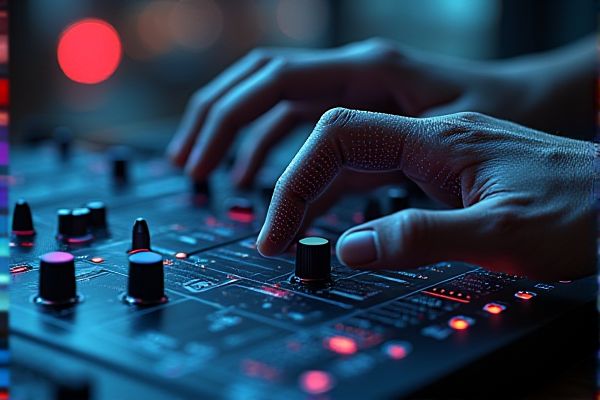
AI technology revolutionizes music production by enhancing creativity and efficiency. Tools powered by AI can analyze vast datasets of musical styles, offering personalized suggestions based on user preferences. These systems assist in tasks such as composing melodies, generating harmonies, and even automating mixing processes, leading to higher-quality outputs. Musicians and producers benefit from streamlined workflows, allowing them to focus more on artistic expression rather than technical limitations.
AI usage in music production tools
Real-time audio synthesis
AI usage in music production tools allows for innovative real-time audio synthesis, enhancing creativity and efficiency. Tools like OpenAI's MuseNet can generate music based on specific genres or styles, providing composers with unique options. This technology offers the possibility of instant adjustments and customization during live sessions, which can significantly enhance performance quality. The integration of AI can also streamline the mixing process, making it easier for producers to achieve desired soundscapes.
Intelligent mixing and mastering
AI in music production tools offers the possibility of intelligent mixing and mastering, which can enhance the overall sound quality of tracks. For instance, software like LANDR employs AI algorithms to analyze audio and apply optimal adjustments, saving time for producers. This technology can provide artists with a competitive edge by streamlining workflows and reducing the need for extensive technical knowledge. The potential for AI to tailor music enhancement to individual preferences presents a significant advantage in an evolving industry.
AI-powered sound design
AI-powered tools in music production offer significant advantages such as tailored sound design and efficient workflow automation. These technologies can analyze vast libraries of sounds, helping producers like those at Berklee College of Music create unique compositions. The likelihood of discovering innovative soundscapes increases as AI suggests novel combinations and arrangements. Musicians can focus more on creativity, potentially enhancing the quality of their work.
Automated music composition
AI usage in music production tools can streamline the creative process by offering automated music composition options. These tools can analyze existing patterns and create new melodies or harmonies, enhancing a producer's workflow. For instance, systems developed by companies like AIVA utilize algorithms to generate original compositions based on user inputs. This technology provides musicians with the opportunity to experiment with new sounds and expand their creative boundaries.
Adaptive pitch correction
AI usage in music production tools, such as adaptive pitch correction, can significantly enhance vocal recordings by providing real-time pitch adjustments. This technology enables artists to achieve more precise and polished performances without extensive manual editing. For example, software like Auto-Tune utilizes AI algorithms to automatically correct pitch discrepancies, streamlining the production process. The chance of producing professional-quality music increases with these advanced tools, allowing both aspiring and established musicians to focus more on creativity.
Genre-specific sample generation
AI in music production tools can facilitate genre-specific sample generation, enhancing creativity for producers. For example, software like Amper Music uses algorithms to create tailored sound samples for genres such as electronic or hip-hop. This technology increases the likelihood of producing unique tracks, allowing artists to experiment without extensive musical training. The ability to generate highly specialized samples offers a significant advantage in a competitive industry.
AI-driven instrument recognition
AI usage in music production tools can enhance creativity by automating various tasks, allowing musicians to focus on their artistic expression. AI-driven instrument recognition technology, like that found in platforms such as Logic Pro, can accurately identify instruments in audio tracks, making it easier for producers to mix and master music. This capability can streamline workflows, providing users the chance to achieve professional-sounding results with less effort. The integration of these AI tools may lead to new possibilities in sound exploration and composition techniques.
Emotion-based music recommendation
AI usage in music production tools has the potential to revolutionize the creative process by streamlining tasks such as mixing and mastering. Emotion-based music recommendation systems can enhance user experience by providing tailored playlists that resonate with individual feelings and moods. For instance, platforms like Spotify utilize machine learning algorithms to analyze user behavior and suggest music that may evoke specific emotions. This creates opportunities for artists to connect more deeply with their audience and for listeners to discover new music that aligns with their emotional states.
Data-driven music trend analysis
AI in music production tools can enhance creativity by automating mundane tasks, allowing artists to focus on composition and arrangement. Data-driven music trend analysis provides insights into listener preferences, enabling musicians to tailor their work for better audience engagement. For example, platforms like Spotify use such analysis to recommend songs, increasing the chances for emerging artists to gain visibility. This synergy between AI and data can lead to more personalized music experiences and potentially greater commercial success.
Virtual session musicians
AI usage in music production tools can enhance creativity by providing innovative soundscapes and automating tedious tasks. Virtual session musicians powered by AI offer composers and producers the opportunity to access a wide range of instrumental performances without needing live musicians. This technology can reduce costs and save time, making music production more accessible to independent artists. With platforms like Splice or LANDR, creators can easily experiment with different musical styles and arrangements, increasing the chances of producing a hit.
 techknowy.com
techknowy.com